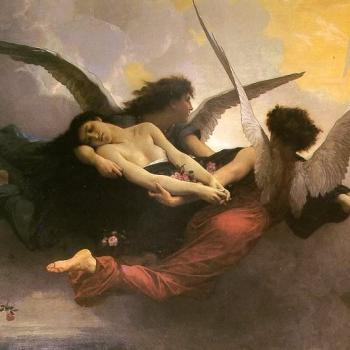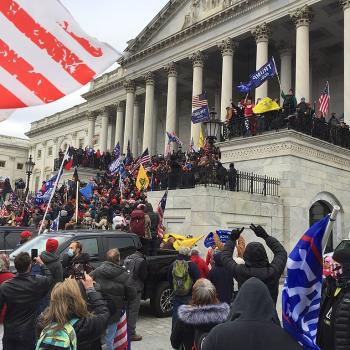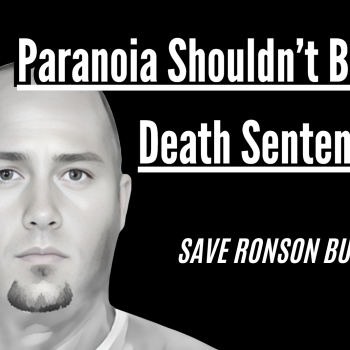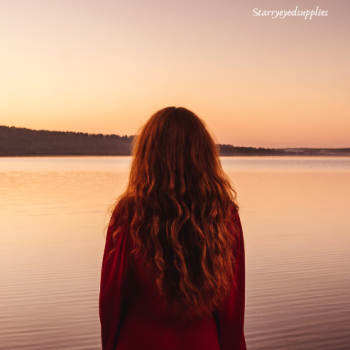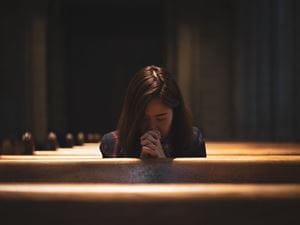
By Naomi Kim
This essay is a runner up in the 2021 Patheos 'Religion Lost & Found' college essay competition. You can see all prize-winning essays here.
The first time I ever went to Mass, I was wearing new shoes. I had gotten dressed that morning feeling both nervous and excited. My very first Mass—it felt like an occasion. And so, ignoring the fact that my new boots were a little too small, I’d wriggled my feet into them nonetheless. Now, though, the boots pinched my toes as I bumbled my way through just about everything. My earlier excitement forgotten, I felt spotlighted in my ignorance as the sun poured through the windows of the plain university chapel. The other students clearly knew what they were doing, and I was the conspicuous, clueless non-Catholic.
I was at Mass because I had found myself missing the traditional—but Protestant—church I’d grown up in: hymnals, pews, a little liturgy. In college, I had quickly discovered that most of the churches in walking distance, the ones popular with other students, were largely contemporary. Sometimes I liked praise bands and high energy prayer, but sometimes I just wanted the quiet of an old, well-worn hymn and the steadiness of the Lord’s Prayer.
And so I was at Mass that Sunday. Just to see, I told myself—although as I mumbled along, uncertain and uncomfortable in the shoes too small, I wasn’t so sure I really wanted to be there after all. I kept sneaking furtive glances at the students around me, who crossed themselves and genuflected correctly and said all the right words without any hesitation. I didn’t know what I was doing. What was I supposed to be doing? Standing? Kneeling? Saying—saying what? And why?
But then, during the Eucharistic liturgy, the silvery sound of bells stilled my confusion. In the quiet chapel, the ringing rippled through the air in a brilliant moment of clarity.
I watched the others—the real Catholics, I thought—take Communion. Something a little like longing stirred in me. Still in my seat while the others lined up for the Eucharist, I knew that not partaking in the sacrament marked me out as a non-Catholic. What would it be like to be one of them, to be folded into their Catholicism, their liturgy? They seemed strangely wondrous to me, dipping those thin wafers into wine, murmuring those words I could not catch from my pew. I had done much the same in the Protestant church I had grown up in, and yet something here, where I was an outsider, felt different.
The five-student choir congregated around the old piano began singing softly, their harmonies wafting through the air to where I sat in the back of the chapel.
The hymn, the bells, stayed with me after Mass ended. As I walked across campus back to my dorm, I found myself thinking that I might go back now and again. A Sunday here, a Sunday there, easing my way into it the way you might break in new shoes. Learning a little bit more each time. What to say. When to kneel.
And as the Sundays accumulated, I caught on to the rhythm of things. I was still genuflecting on the wrong knee, but I knew when to kneel and stand and bow. I discovered the order of Mass, printed and pasted into the front of the hymnals. I picked up on melodies. As the Nicene Creed and the Gloria grew familiar, I grew to love them. God from God, Light from Light. We worship you; we give you thanks; we praise you for your glory.
I went to Mass enough times—and mentioned it enough times—that another Protestant, looking confused, asked me, “So are you Catholic?”
“No,” I said quickly. Then I faltered. I didn’t know how to explain myself. Lamely, I said, “I just…I just go to Mass sometimes.”
I confess that I still don’t know how to explain myself. I know why I first went to Mass, but why did I keep going back?
Sometimes, I wonder if maybe it was the 103 Korean martyrs canonized in 1984. Maybe it was because of my great-grandmother, who was the only Catholic I knew of in my family history. I had always been interested in her story—how she survived early widowhood and the Korean War and solo parenting. She had been non-religious until, much later in her life, she converted to Catholicism. (Why? How would she explain it?) Maybe I secretly, irrationally, believed Catholicism could help me achieve that elusive sense of Korean-ness, could root me to a heritage and a history I felt I didn’t know.
Or maybe it was the liturgy. The hymns. The rooted tradition, the ancient devotion. Maybe the gentleness of it all. The grace. Maybe it was how watching others take Eucharist made me long for it, confirmed to me its unspeakable importance.
Maybe it was the way there was a weight to Mass, but never a burden. Everything was significant, each word a living ember held to my lips. Maybe it was the way Mass carved out quiet, a breath in a breathless life of deadlines and papers and constantly running out of time. Maybe it was the way there seemed to be no time at Mass, save for eternity.
Maybe it was God. God and the women. God through the women. Social activist Dorothy Day. Medieval mystic Julian of Norwich. Poet and Benedictine oblate Kathleen Norris. When I traced their paths of justice and love and devotion despite doubt, my pilgrimage landed me here, kneeling at Mass. God was the gentle presence beside me, before me, behind me, amplified in the quiet.
God, as close and alive as the breath in my lungs.
God was in the enfolding embrace of the dimly lit chapel on Ash Wednesday, when the priest drew a cross of ashes on my forehead. At compline, when I sang psalms in my thin, off-key voice. At Tenebrae, the chapel plunged in darkness and shaken by the loud noise. On Good Friday, when I leaned forward to kiss, clumsily, the icon of the crucified Christ.
The feel of smooth wood lingered on my lips as I returned to my pew. On the other side of the chapel sat a girl in a hijab, sitting quietly through the veneration. I wanted to ask her, what brings you here? I wanted to ask her, if you decide to come back, what will bring you back? I knelt and marveled at the way the Lenten traditions had been teaching me to dwell in the darkness, the not-knowing. I thought, Lamb of God, you take away the sins of the world. I imagined a life in which I would be confirmed Catholic at the Easter vigil, in which Mass would become a regular part of my life, in which I, too, could take the wafer and the wine.
That would be the neater ending, perhaps. The more fitting one. The one that might make a good story. I’d tell you what it was like, being received into the Catholic Church, how it felt like coming home, how I felt enfolded by all the saints in heaven. I’d tell you Easter was full of light and joy and life, how it struck me in a new way because I was making a kind of beginning myself, as a new Catholic. I’d tell you of the taste of bread and wine, body and blood, what a sweet fulfillment it was of the longing I’d felt.
But I confess: that isn’t what happened.
I was there at Mass on Easter, but not as a newly confirmed Catholic. I was there the way I was before, the way I imagine I will be whenever I am at Mass again—as a Protestant. Curious. Comforted. I confess: I have too many of the usual Protestant hang-ups to wholeheartedly embrace Catholicism. I confess: I do not share the Catholic Church’s every stance. I confess: somehow I am Protestant in principle, in ways I cannot quite articulate.
But I confess, too, that it seems to me I will always be a kind of Protestant pilgrim. It seems to me that I will always be wandering along, and into, and through, this Catholic tradition which is not quite mine. Perhaps I will never quite be able to explain myself.
That Easter Sunday, an extravagance of sunlight gushed forth into the chapel. The pews were packed with students singing a hymn of resurrection. As the priest passed by with the aspergillum, sprinkling holy water everywhere, I felt droplets land lightly on my arm.
Bless me, I thought, even me also.
And it was already so.
Naomi Kim is a senior at Brown University. In the fall, she will begin working toward her PhD in English at Washington University in St. Louis. Her writing has previously appeared in Lunch Ticket, LETTERS, Unbroken Journal, and other publications.
5/7/2021 8:37:18 PM
